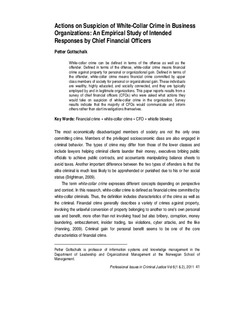Actions on suspicion of white-collar crime in business organizations: An empirical study of intended responses by Chief financial officers
Academic article
Permanent lenke
http://hdl.handle.net/11250/93380Utgivelsesdato
2011Metadata
Vis full innførselSamlinger
- Scientific articles [2181]
Originalversjon
Professional issues in Criminal Justice, Vol. 6, Iss. 1&2, pp. 41-51Sammendrag
The most economically disadvantaged members of society are not the only ones
committing crime. Members of the privileged socioeconomic class are also engaged in
criminal behavior. The types of crime may differ from those of the lower classes and
include lawyers helping criminal clients launder their money, executives bribing public
officials to achieve public contracts, and accountants manipulating balance sheets to
avoid taxes. Another important difference between the two types of offenders is that the
elite criminal is much less likely to be apprehended or punished due to his or her social
status (Brightman, 2009).
The term white-collar crime expresses different concepts depending on perspective
and context. In this research, white-collar crime is defined as financial crime committed by
white-collar criminals. Thus, the definition includes characteristics of the crime as well as
the criminal. Financial crime generally describes a variety of crimes against property,
involving the unlawful conversion of property belonging to another to one's own personal
use and benefit, more often than not involving fraud but also bribery, corruption, money
laundering, embezzlement, insider trading, tax violations, cyber attacks, and the like
(Henning, 2009). Criminal gain for personal benefit seems to be one of the core
characteristics of financial crime. financial officer (CFO) react when suspicion of white-collar crime emerges? Results from
a survey of CFOs in Norway are applied to answer this research question.
Beskrivelse
Published version of the article. Publishing journal is an Open Access-journal. See http://www.picj.org
